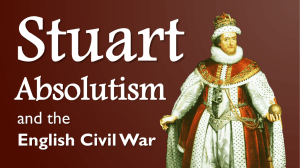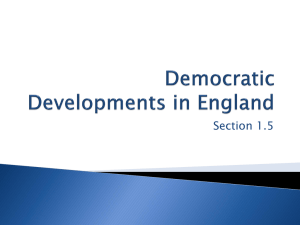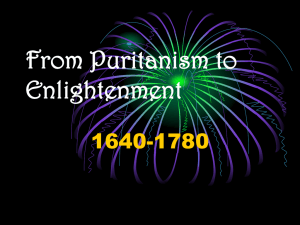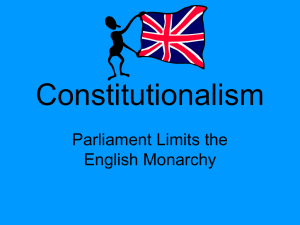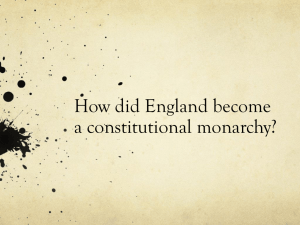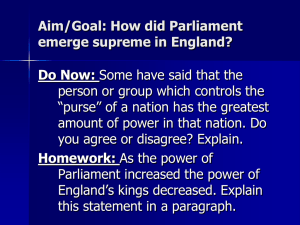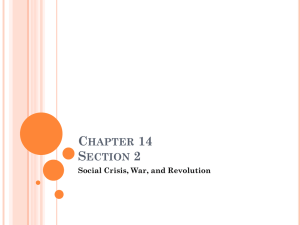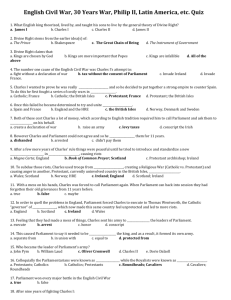File - ap european history
advertisement
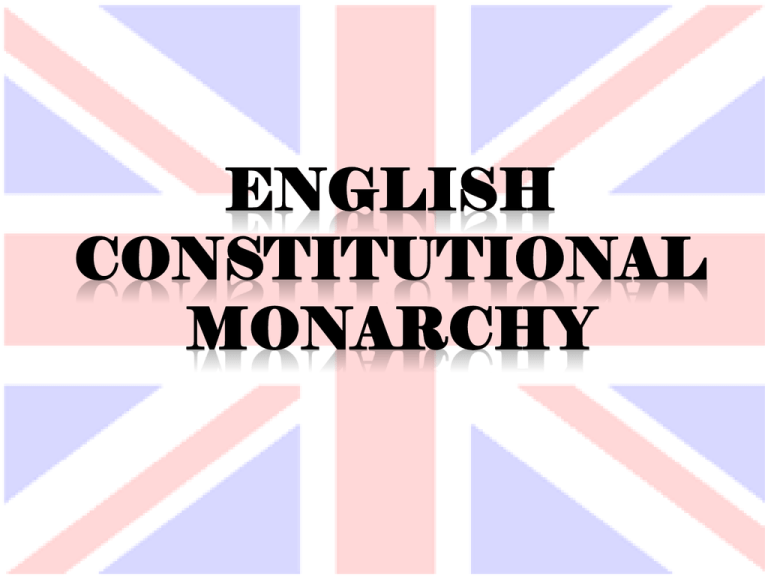
Jury System – Henry II (1154-1189) – royal courts, grand jury investigations, some cases trial by jury Magna Carta – 1215 King John – limit royal power Parliament – 1295 Edward I expanded “Great Council” to include middle class Common Law – late 13th century legal precedents REVOLUTIONS – (1642-1660) – (16881689) overthrow of two Kings (Charles I, James II) Confirmed the constitutional powers of an elected monarchy Laid the foundations for the idea that gov’t must guarantee certain rights for people under the law Henry VII, Henry VIII, Elizabeth I Outwardly appeared to consult parliament and the people – actually dominated Aided the middle class – trade, overseas expansion, law and order Popular, intelligent, capable James I (1603-1625) Charles I (1625-1649) ENGLSIH CIVIL WAR (1642-49) THE COMMONWEALTH (16491660) Charles II (1660-1685) James II (1685-1688) William III (1689-1702) & Mary II (1689-1694) Anne (1702-1714) 1566-1625 James VI Scotland Son of Mary Queen of Scots Blundering tongue, ungracious manners Divine Right of Kings – “Kings are the breathing images of God on earth.” Ruled Scotland for 58 years and England for 22 years Tried to unite Scotland, Ireland, and England – term Great Britain Patron of the arts – “Macbeth” 1598 – The Trew Law of Free Monarchy “Urged to wave to the crowds who waited to greet their new ruler, James was tired and threatened to drop his breeches ‘so they can cheer at my arse.” November 5th Guy Fawkes Night - 1605 “Gun Powder, Treason, and Plot We see no reason why gunpowder treason Should ever be forgot.” PARLIAMENT -POWER STRUGGLE RELIGION: Puritans “No Bishop No King” Spanish Match ECONOMIC: Taxation – control of the ‘purse strings’ (r. 1625-1649) Son of James I Married Henrietta Maria – Catholic Princess of France Arrogant, narrow-minded, obstinate Divine Right Stately, dignified, hardworking Petition of Right (1628) “Stuart Magna Carta” Parliament protested Charles I claim to Divine Right Assertion of Power Control of “Purse Strings” 1629-1640 Charles disregards the Petition of Right and asserts “divine right” Illegally raises money “tonnage & poundage” and Ship Money Star Chamber Courts – accused denied jury, tortured Due to the Scottish Rebellion Charles needs $$$$$$ Parliament refused to grant Charles I money unless he addressed their grievances After meeting for 3 short weeks Charles dismissed Parliament April 1640 Nov. 1640-March 1660 REFORMS 1. Removal of Royal Favorites Thomas Wentworth – Earl of Strafford (1641) William Laud – Archbishop of Canterbury (1645) 2. Triennial Act King to summon Parliament once every 3 yrs Sheriffs of the countries could hold elections if the King did not Parliament could not be dissolved without consent Charles furious, sent soldiers to arrest the 5 leading members of Parliament Two factors caused Parliament to be victorious Scots fought on the side of the Roundheads “New Model Army” – created by Oliver Cromwell Royalists (Cavaliers) Parliamentarians (Roundheads) a House of Lords † House of Commons a N & W England † S & E England a Aristocracy † Puritans a Large landowners † Merchants a Church officials † Townspeople a More rural, less prosperous † More urban , more prosperous 1599-1658 “New Model Army” – (1645) 22,000 men Battle of Naseby (1645) The Commonwealth 1649-1653 The Protectorate 1654-1660 Strict Puritan Banned newspapers, used a network of spies, silenced enemies Military Dictatorship? Rump Parliament (1648) 70 members Rump Resolution = Charles I – traitor, convicted of treason “Man of Blood” Charles offered no defense refused to recognize the court On the 5th day condemned to death “I go from a corruptible crown to an incorruptible crown” – Charles I Jan 30, 1649 “Walking upon the scaffold with a firm step, the king in a speech disclaim all guilt. He calmly laid his head on the block, prayed silently for a short time, and extended his arms as a signal to the executioner. His head was severed with one blow.” 1649-1660 Written Constitution – Instrument of Government Cromwell Lord Protector – Ireland, Scotland, England Irish Uprisings – Cromwellian Settlement “Curse of Cromwell” – Scottish settlement in Ulster (Northern Ireland) “Blue Laws” – Prohibited Gambling, Horseracing, Dancing, Fancy Dress, Theater 1660-1688 Charles II (r. 1660-1685) “Merry Monarch” Restored theaters, reopened pubs Charm, poise, political skills Religious Toleration Political power-sharing (r. 1685-1688) Openly Catholic Second Declaration of Indulgence (1687) – suspended all laws against Catholic dissenters Tories – strong hereditary monarchy, restore ceremony of the Anglican Church Whigs – parliamentary supremacy, toleration for protestant dissenters William married to James II daughter Mary 7 leaders of the Whigs and Tories invite William and Mary to be crowned 1688 they arrived with 16,000 troops Bloodless victory GLORIOUS REVOLUTION? It settled all of the major issues between King & Parliament It served as a model for the U. S. Bill of Rights It also formed a base for the steady expansion of civil liberties in the 18c and early 19c in England. 1. The King could not suspend the operation of laws. 2. The King could not interfere with the ordinary course of justice. 3. No taxes levied or standard army maintained in peacetime without Parliament’s consent. 4. Freedom of speech in Parliament. 5. Sessions of Parliament would be held frequently. 6. Subjects had the right of bail, petition, and freedom from excessive fines and cruel and unusual punishment. 7. The monarch must be a Protestant. 8. Freedom from arbitrary arrest. 9. Censorship of the press was dropped. 10. Religious toleration. William III (1689-1702) Mary II (1689-1694) The Toleration Act (1689) – freedom to PROTESTANT dissenters – NOT CATHOLICS Act of Settlement (1701) – To insure Protestant rule – HANOVER DYNASTY Act of Union (1707) – United Kingdom of Great Britain IS ENGLAND A DEMOCRACY? NOT YET? 1689-1832 – ruled by the elite ROBERT WALPOLE (16761745) First Prime Minister CONSTITUTIONALISM & ABSOLUTISM two main responses to the disorder and breakdown of religious wars DUTCH REPUBLIC (1648) Stadholders House of Orange POLAND-LITHUANIA Elected Monarchy Parliament (Sejm) “free veto”


